Email is likely the most standard means of communication online. Everyone has an email address, and most online services require you to register using one.
As such, you’ll likely accumulate a ton of sensitive details in your inbox throughout the years.
Unfortunately, though, email is also a relatively easy platform for hackers, cybercriminals, and other malicious users to target through cyber attacks.
And as the technology available to these criminals improves over the years, internet protocols are struggling to keep up with their security standards, forcing email providers to implement their own anti-hacking methods.
Most email providers already have a level of security.
However, we’re here to look at the most secure email providers to minimize the risk of letting hackers into your electronic footprint.
Most Secure Email Services (Overview)
We’ve included an overview of our top picks below. For detailed information on each pick, scroll down.
Benefits of Secure Email Providers
Email services are ubiquitous in the online world for business and personal use, so they’re a naturally common target for cybercriminals and hackers who want to gain access to your private information.
Add to that the sensitive nature of most inboxes and you have even more motive for malicious users to try and reach that information.
Despite how old email services are, their protocols haven’t kept up with the rapidly developing hacking and penetration methods, so we have to rely on the most secure email providers to protect us from possible vulnerabilities.
Hackers nowadays use artificial intelligence to perform cyber attacks and eventually gain access to unsecured email addresses and networks.
For business users who often have confidential company-related info in the inboxes of their professional email addresses, a small data breach can lead hackers to reach other people in the company, effectively creating a loophole that grows as more users lose their email security.
They can also disrupt an entire company’s workflow by spreading malware, such as spyware or viruses, to other workmates, whom they can message through the compromised recipient’s inbox.
But even if hackers breach a personal use email address, they can exploit it for identity theft.
Or, even worse, if you have extremely sensitive info like bank or credit card details somewhere in your inbox, they can reach that as well.
But with a secure email service provider, you can add an important layer of protection to your emails.
How Do Secure Email Services Work?
Standard email providers use a method known as transport layer security (TLS) to encrypt data and prevent hackers from gaining access to any sensitive information while eavesdropping.
Without TLS, they’d be able to see the messages sent in plain text, but messages in encrypted form appear as gibberish.
Secure email providers add another layer called end-to-end encryption.
Through this method, the encryption happens at the sender’s end, and then they send encrypted messages to the receiver, whose provider can decrypt the text, hence the name.
Here’s a useful analogy to help you visualize this. With TLS, it’s like giving a messenger an unsealed letter and relying on them to deliver it to the recipient.
But with end-to-end encryption, you seal the letter before giving it to the messenger, and only the recipient can break the seal.
Secure vs. Private
We feel it’s necessary to distinguish between the terms secure and private, as both are often used interchangeably when talking about email services (and other technologies at large).
A secure service is one that thrives on protecting your information from being reached by third parties.
This is commonly done through encrypted messages.
Meanwhile, privacy in the context of email services refers to tracking.
Does the provider track your information and sell it to third parties for targeted ads?
Big tech email providers, like Gmail and Outlook, have enough security features to protect you from most cyber threats.
But they’re not private because their bread and butter is information selling.
9 Most Secure Email Providers in 2022
Now, let’s get into the meat of the matter and see how each secure email service provider mentioned above holds up.
We tried these email services and this is how our experience was with each of them.
1. ProtonMail
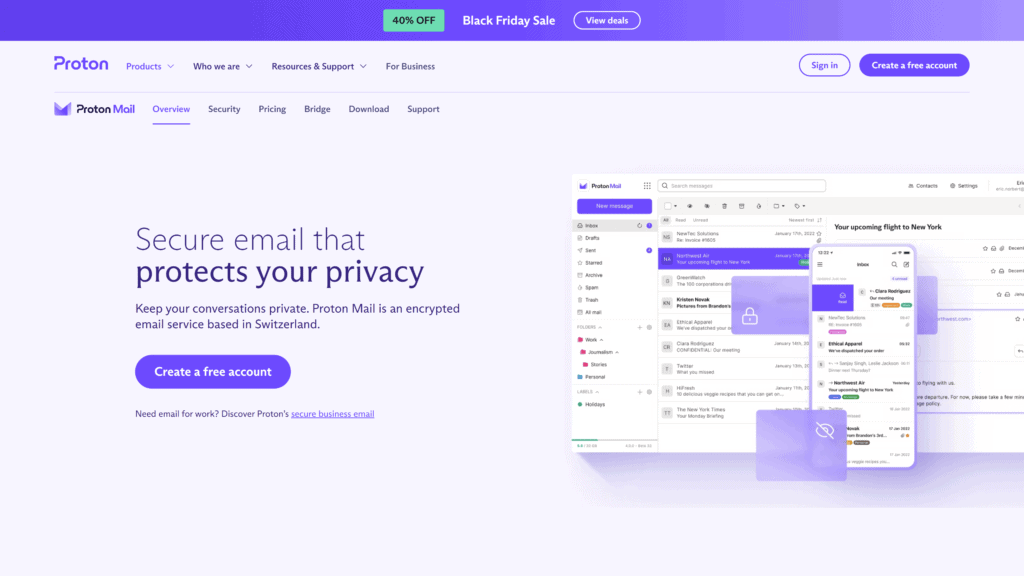
Overview
ProtonMail is a strong candidate for the most secure email service in 2022 and has built this reputation since its founding in 2013 in Switzerland, where it’s still located today.
Of course, ProtonMail uses end-to-end encryption to ensure complete email security between senders and recipients in an email conversation.
It also has a no-logs policy, meaning it’ll never keep records (logs) of what circulates in its servers.
As for the server location, not only are ProtonMail’s servers in Switzerland, which is one of the most privacy-respecting countries on the planet, but they’re also kept in underground nuclear bunkers.
Even your account information is encrypted with zero-access encryption, meaning that only you have access to them.
The downside here is that Proton can’t help you retrieve your account if you forget your login credentials.
But we don’t mind seeing the best secure email providers offer this level of privacy in exchange for extra user responsibility.
All these security features are certainly hard to beat.
And because of them, Forbes labeled ProtonMail as the only email system that the NSA can’t access.
Though that assessment was made nearly a decade ago and we’ve seen secure email providers pop up since.
You can only access ProtonMail through your web browser on computers since there’s no dedicated desktop application.
However, there are mobile apps for Android and iOS, so it has got that base covered.
ProtonMail offers a free version with 1 GB of storage space across its email services, secure calendar, and drive.
If you need more bandwidth, you can choose one of Proton’s reasonably-priced paid plans.
There are also commercial plans for business users.
Main Takes
- Free secure email service
- End-to-end encryption on messages
- Zero-access encrypted account info
- No-logs policy
- Two-factor authentication
- Servers hosted in Swiss bunkers
- Browser, Android, and iOS applications
- Sleek user interface
- Free version available with decent email storage
- Scalable paid plans for personal and business use
2. Tutanota
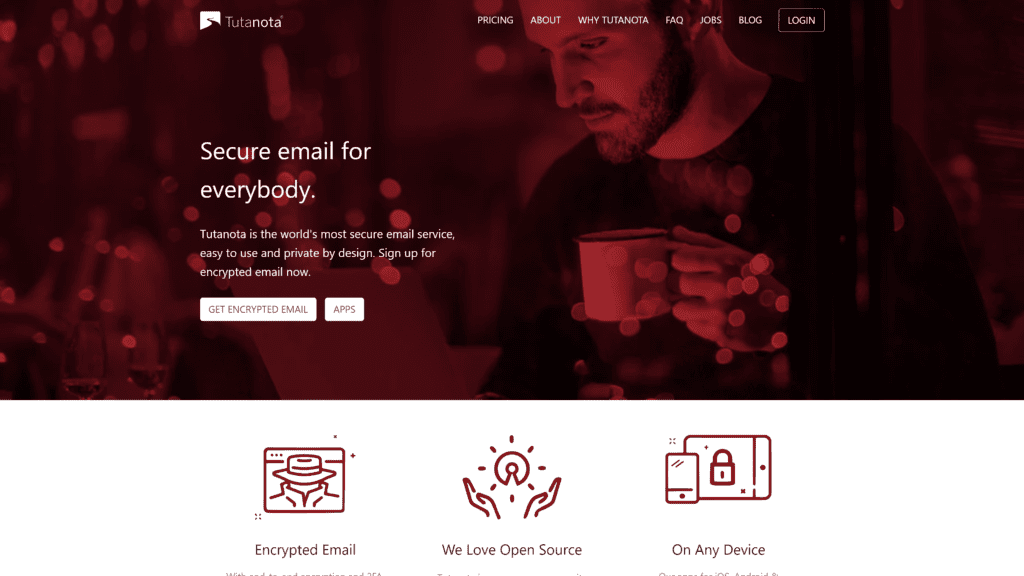
Overview
Tutanota is open-source software that’s the next best option after ProtonMail and has gained the trust of more than two million users since its launch in 2011.
Tutanota’s approach to privacy shows how seriously it takes it.
For instance, instead of using Pretty Good Privacy (PGP) encryption, it relies on the more nuanced Advanced Encryption Standard (AES) and Rivest-Shamir-Adleman (RSA) systems.
This combination of two different systems makes it one of the most secure providers on the market.
It even encrypts the subject line, sender, and receiver, so all the information in your emails is out of reach for eavesdroppers and hackers.
But that’s not all! It even removes IP addresses and other identifying information from the packet metadata to ensure that even the most curious hackers don’t collect any info on the sender or recipient.
You can even send encrypted emails to non-Tutanota users; then, they’ll receive a link to decrypt the message with a footnote about the reason why the message is encrypted.
That same link will also allow them to reply with an encrypted message, so you don’t have to worry about security concerns from users on Gmail, Outlook, or other providers.
The infamously controversial bit around Tutanota for absolute privacy seekers is that it’s hosted in Germany, a member of the Fourteen Eyes association.
However, Germany and German law respect privacy.
And thanks to the company’s no-logs policy, your history logs will be in safe hands—that is no hands at all!
If you want to try Tutanota, you can do so as it offers a free plan with up to 1 GB of storage space.
Though if you need more space, it offers affordable paid plans with a generous amount of secure cloud storage space.
You can use it through your browser, Windows app, or mobile app (iOS and Android).
Main Takes
- Free encrypted email service
- End-to-end encryption
- Two-factor authentication
- AES and RSA encryption instead of just PGP
- Ad-free app available on browser, Windows, iOS, and Android
- Free version available
- No-logs policy
- Easy to communicate with external email users
3. Mailfence
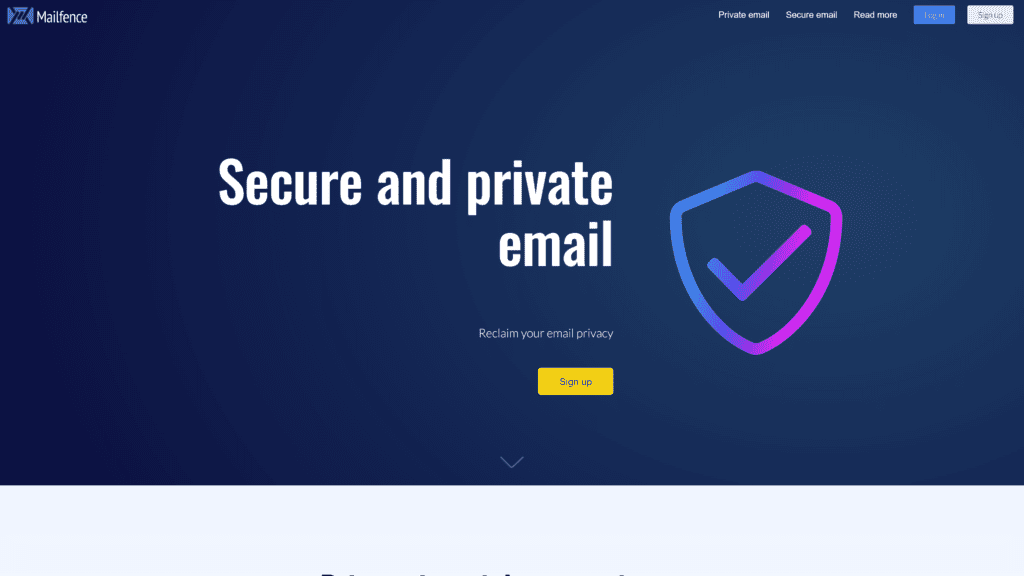
Overview
Mailfence is a secure email service that was founded in 2013 by ContactOffice, a Belgium-based company with experience in making cloud-based software similar to the modern-day G Suite.
Mailfence’s end-to-end encryption relies on an open-source version of OpenPGP.
This makes it a usable cross-platform with other secure email providers that use OpenPGP as well, such as ProtonMail, and the emails will receive the same quality of protection.
Digital signatures are one of the main selling points of Mailfence.
A digital signature is practically a private token unique to you that verifies your identity.
It’s a very powerful tool against identity theft, forgery, or impersonation.
Mailfence adds your digital signature automatically when you use its encrypted email services, so you don’t need to worry about doing that as an extra step.
The integrated key store in Mailfence allows you to freely generate and edit OpenPGP keys without relying on third parties plugins.
Apart from that, the Mailfence app, which is available on internet browsers, iOS, and Android, is completely ad-free and doesn’t track you or sell your information to third parties and advertisers, so it’s a very private email service provider as well.
There’s a free version of Mailfence, but unfortunately, it’s limited to only 500 MB of email storage space and another 500 of document file storage.
Of course, you can always upgrade to one of the paid plans if you need more bandwidth.
Main Takes
- Founded in 2013 by an experienced Belgian cloud software company
- End-to-end encryption with OpenPGP
- Digital signatures to ensure authenticity and minimize impersonation
- Built-in key store to edit your PGP key
4. mailbox.org
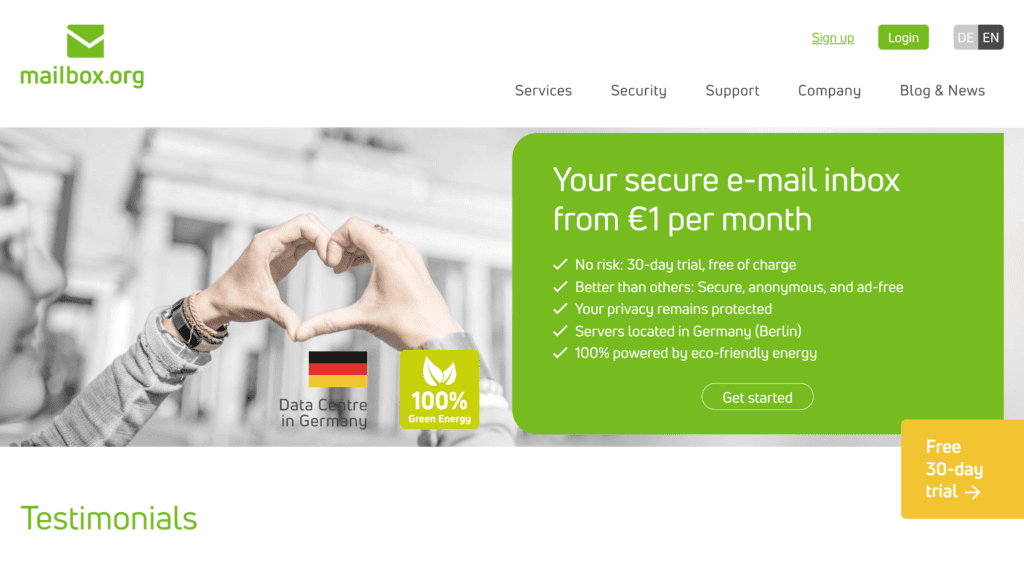
Overview
When you think of rich history and heritage, at least in the context of secure email services, the first thing that should pop up is mailbox.org.
It’s one of the oldest and best secure email providers in 2022, tracing its roots back to 1989 when it was founded as a communication tool between editors of a student newspaper.
Nowadays, mailbox.org is still going strong.
As a secure email service, it’s based in Berlin, Germany, so the servers are in safe hands.
Yet, the company goes the extra mile to give you stronger security features.
For example, you can sign up for an account without revealing a shred of personal information about yourself.
You can even use mailbox.org on its custom Tor relay and pay for your subscription plan with bitcoin to reduce your digital footprint even more.
And since mailbox.org uses the OpenPGP system, its encrypted email services are compatible with other PGP-based email service providers like ProtonMail.
The main downside of mailbox.org is the lack of a free version.
However, the paid service is incredibly affordable, and you can try it without risk through a 30-day free trial.
Besides, the paid plans give you access to additional services from mailbox.org, including an encrypted calendar, text processor, and spreadsheet editor.
Main Takes
- Time-tested and well-established service (since 1989)
- OpenPGP end-to-end encryption
- Two-factor authentication
- Usable without entering personal info
- Comes with a calendar, text processor, and spreadsheet editor
- 30-day free trial available
5. StartMail
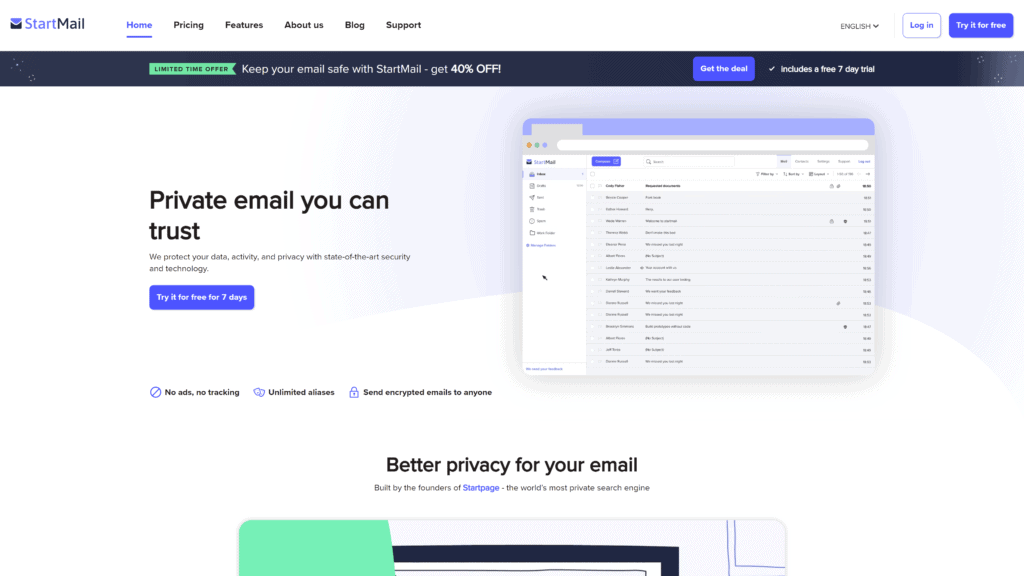
Overview
StartMail is a secure mail service based in the Netherlands, a privacy-friendly country that focuses on customer protection.
It was founded and is still managed by the same team that runs Startpage, the private, customer-oriented search engine with no tracking.
The developers have been running Startpage for a while, and it’s proven to be a useful tool for those who value privacy, so you can rely on it to deliver with StartMail as well.
StartMail uses PGP encryption to secure emails.
This also makes it compatible with other PGP encryption-based clients, such as ProtonMail and Mailfence.
But even if you’re emailing someone on an external email provider, they’ll receive a brief with a disposable link to your encrypted message that they can only access by answering a previously agreed-upon question.
So even if a hacker gains access to that message by some chance, they won’t be able to view its contents.
One of our favorite features on StartMail is the ability to create burner email addresses quickly and easily.
This is helpful for situations when you need a disposable yet reliable email address, such as when you’re registering on another platform and don’t have time to create a new one.
Unfortunately, there are two main flaws with StartMail.
The first is the lack of a dedicated mobile app.
But judging from our experience, this sounds worse than it is in reality, as StartMail has a very mobile-responsive website, so you won’t struggle with navigating it on your phone.
Second, there’s no free version.
You can test StartMail out risk-free using the 7-day free trial, but there’s no small bandwidth plan for people on a budget.
However, the paid plans are affordable and you get a ton of benefits with them, so we can understand StartMail’s reasoning.
Main Takes
- Dutch secure email provider founded by Startpage developers
- Uses PGP encryption, compatible with others that do
- Sends disposable links with encrypted texts to external, non-supported emails
- Lets you create burner email addresses quickly and easily
- A 7-day free trial is available
6. CounterMail
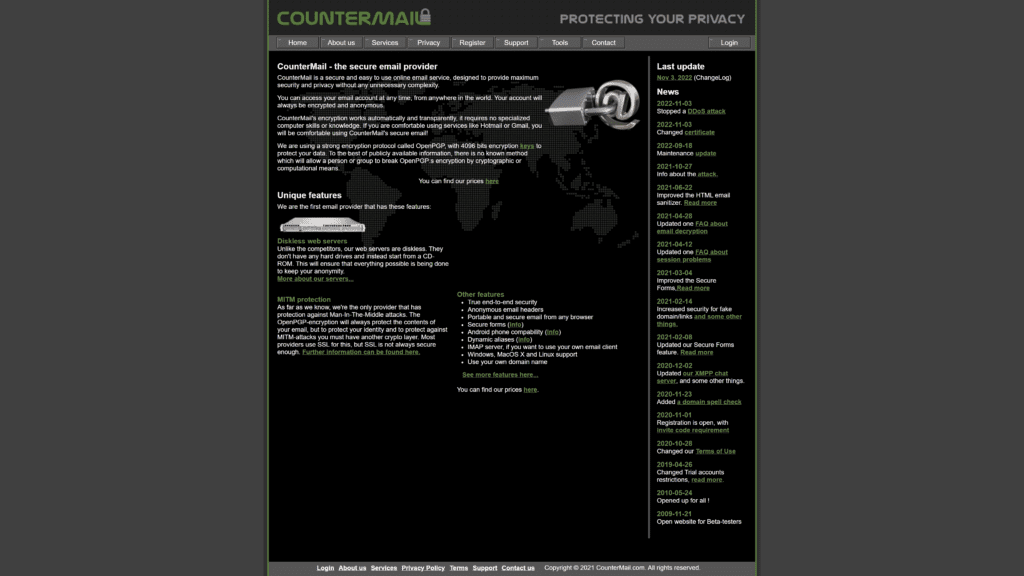
Overview
If you go to the CounterMail website, you might be hit with an immediate shock at its design choices.
We certainly felt that way to an extent, and we initially thought it might be a deprecated website because of the older aesthetic.
However, CounterMail is a secure email provider that doesn’t need a sleek and catchy website to prove its capabilities where it matters.
Like most other secure email services, CounterMail relies on PGP encryption to amp up its users’ web-based privacy.
But it also adds a touch of added security by protecting against man-in-the-middle attacks. And by touch, we mean a lot.
CounterMail adds AES and RSA encryption, similar to Tutanota above.
But instead of using them as a replacement for PGP, it complements all the technologies for maximum efficacy.
Moreover, you can enable two-factor authentication on CounterMail using a USB key or one-time password generated from a third-party app.
So even if your account info is somehow compromised, no one will be able to log in to your account without one of these tools.
CounterMail is based in Sweden, which has great privacy laws but is still part of the Fourteen Eyes.
However, the company pledges to protect its customers’ privacy, and it strives to do so through methods like no-log policies, anonymous email headers, email data encryption, and not storing any user data (except for some payment info during the first 14 days).
Moreover, CounterMail uses strong open-source algorithms that anyone can view and improve to optimize the experience.
Unfortunately, there’s no free version of CounterMail.
However, its prices are affordable and you can try it for free for 10 days before finalizing your purchase.
And that website design, by the way, is because CounterMail was founded in 2008 and the site hasn’t changed much since.
Main Takes
- Sweden-based secure email provider
- PGP, AES, and RSA encrypted email services
- Robust two-factor authentication
- Open-source algorithms
- No-logs policy
- Encrypted emails and headers
- Free 10-day trial
7. Posteo
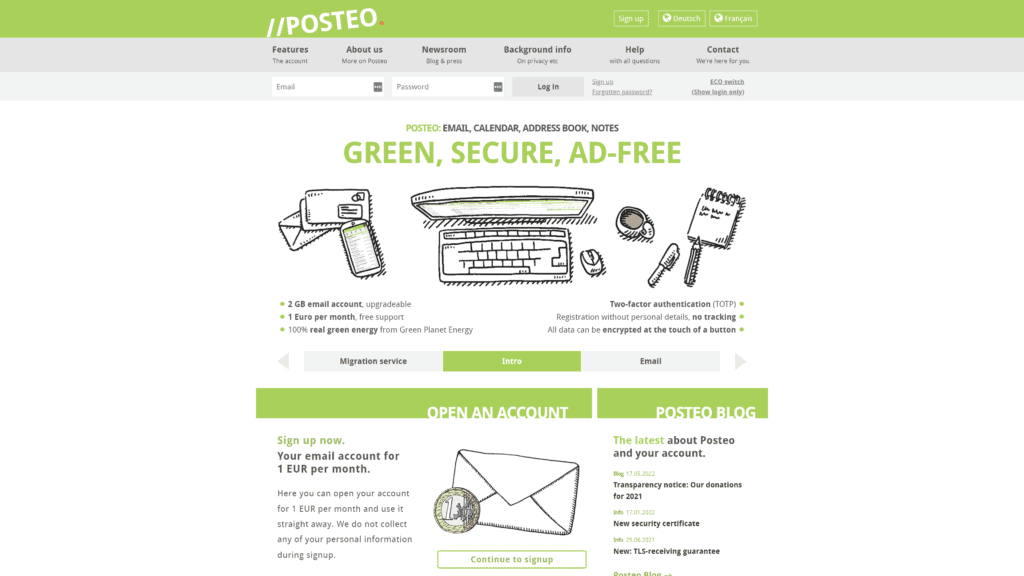
Overview
Posteo is one of the most affordable and highly secure email service providers we’ve come across.
It operates its servers in three cities in Germany: Berlin, Frankfurt, and Bielefeld.
Posteo’s primary mission is to protect your privacy, and it does so without collecting your data or even asking for personal info (i.e., name and address) when registering, making it an effective anonymous email service.
Even payment methods and details are made anonymous automatically and don’t link to your email address.
Secure email providers weren’t much of a concern to the general public until the mid-2010s.
At the time, Posteo beat its competition by being the first email provider to utilize DNS-based Authentication of Named Entities (DANE), a strong security protocol that secured users against hackers.
Transport layer security (TLS) encryption plays a big role in Posteo’s method.
Platform access and email transmission are encrypted with TLS and Perfect Forward Secrecy (PFS) to increase security.
You can also choose to encrypt inbound emails with your S/MIME or OpenPGP key.
The server’s hard disks are also AES encrypted to protect the data in case of theft or breaches, though these are extremely unlikely to happen in the first place.
And all these encryption algorithms are open-source, so they’re verifiably efficient at what they do and are open for improvement by the community.
One shining feature of Posteo is its support for IMAP, POP, and SMTP, which allows you to integrate it with external mail apps like Apple Mail on iOS or K-9 Mail on Android.
As for finances, there’s no free plan.
However, the plans are seriously affordable and offer generous bandwidth with ad-free access, so Posteo remains a very strong contender for the privacy-conscious user.
Main Takes
- Top-notch secure email service provider based in Germany
- Doesn’t track any user data – not even login or payment info
- Platform access and email transmission are TLS encrypted
- PFS protocol increases protection
- Server hard drives are AES encrypted
- Can be used with a personal S/MIME or OpenPGP key
- Support for IMAP, POP, and SMTP integration
8. Librem Mail
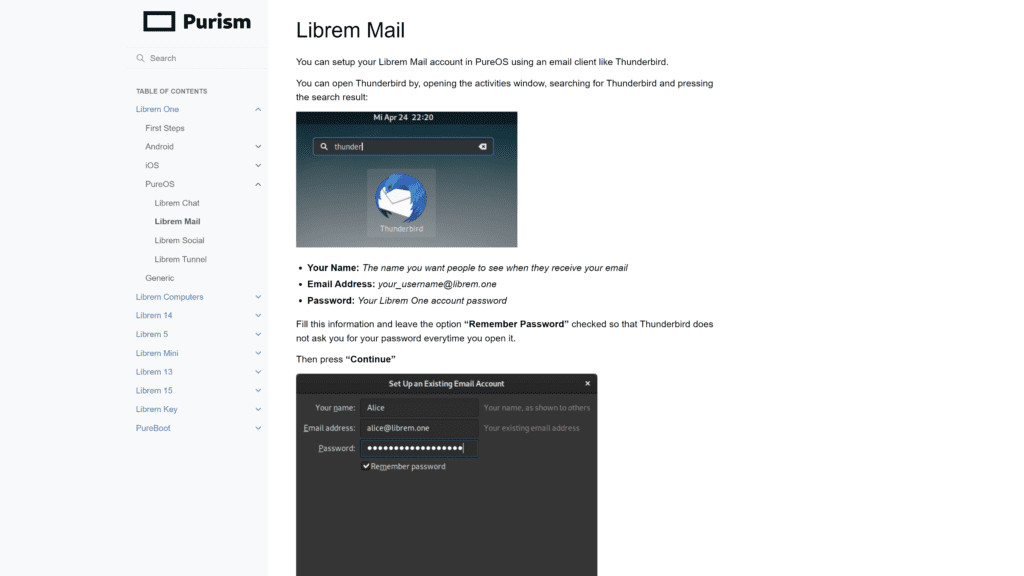
Overview
Librem Mail is a mail provider that’s part of a bigger set of software platforms made by the American company Purism, which focuses on anti-big corporations technology that respects your privacy and doesn’t track your data.
To be more specific, Librem Mail is part of a bundle called Librem One, which includes other applications for social media, IRC chat, and a VPN. But our focus here is on the email provider.
Although the parent company is US-based, Librem Mail is one of the most secure providers out there, thanks to its reliance on K-9 Mail with OpenKeychain.
As for email transmission, it’s fully encrypted using OpenPGP.
The main downside of Librem Mail is that there’s fairly limited support for it.
For example, you can only install it on the Linux-based PureOS distro if you want to use it on a computer.
However, you can install it on Android and iOS but there are a few caveats.
For the Android version, you need to install the OpenKeychain app to enable encryption; then, you can download Librem Mail and install it following the right steps.
If you’re on iOS, it’s a bit less fruitful as there’s no support for OpenPGP encryption on iPhones yet.
You can install the Librem client on your default mail app, but it’s only really useful for browsing until you’re back on your computer.
Because of these nuances, we only recommend Librem Mail to only the most privacy-conscious users who already use Purism’s other services (or don’t mind switching to them), as it’s much easier to integrate these platforms together.
Main Takes
- Extremely secure email provider
- Part of the bigger Librem One bundle by Purism
- Integrates well with other applications in the bundle
- Works on K-9 Mail and OpenKeychain
- Encrypts emails with OpenPGP
9. Runbox
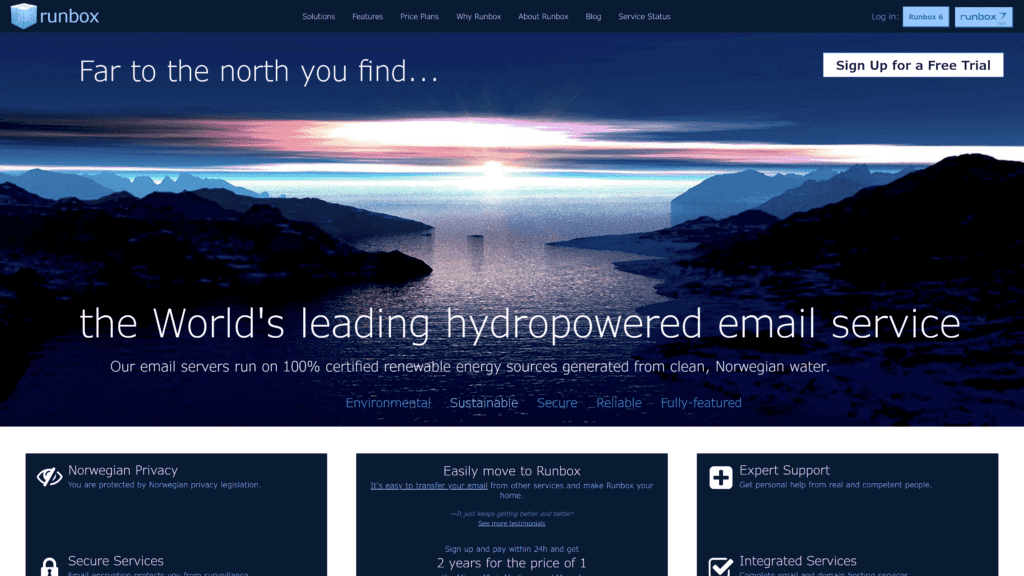
Overview
Last but not least, Runbox is a secure email provider based in Oslo, Norway, which prides itself on granting every email client the graceful privacy afforded by Norwegian law.
Although Norway isn’t part of the Five Eyes association, it’s part of the bigger Nine Eyes.
But that’s typically not a problem for privacy-loving countries like Norway since your data won’t be shared with any third parties.
However, the Norwegian courts could request it, so consider if you’re willing to take that trade-off.
As expected from apps like Runbox, it uses standard transport layer security with SSL certificates for added authentication.
And if you want to remain anonymous during email transmissions, you’ll enjoy how Runbox removes identifying information, such as IP addresses, from email headers.
Runbox is also very strict with account access, which is a massive protection against hackers who have your credentials from data breaches.
For instance, you can whitelist your IP address so that your account only accepts it.
And then there’s two-factor authentication, of course.
There’s no free plan on Runbox, but you can try it for free for 30 days before making up your mind.
Main Takes
- Secure email provider in Oslo, Norway
- TSL and SSL security
- Anonymous email headers
- IP address whitelisting and two-factor authentication
- Free 30-day trial
How to Choose the Most Secure Email Provider for You
Emails have been around since before the internet.
So naturally, there are many email providers out there.
But how do you choose a secure email provider?
Here are the factors to keep in mind before making your decision.
1. End-to-End Encryption
End-to-end encryption is the most secure method to exchange information online at the moment.
It’s an essential feature in any secure email provider, so don’t overlook it for other encryption methods.
Without end-to-end encryption, email providers can theoretically see your emails if they want to.
But with that technology, only you and the recipient have that privilege.
2. Two-Factor Authentication
A simple yet common and effective method that hackers rely on to gain access to your account is by using leaked information about you from data breaches of other websites.
For instance, if you use the same email and password on several platforms and one of them faces a big data leak, your info could easily land in the hands of a malicious user.
You can eliminate the risk of losing your email like this by using two-factor authentication, which, as the name suggests, requires two methods (factors) to authenticate before allowing you to log in to your account.
Commonly, the first factor is your login credentials (email/username and password), then the second factor can be anything that relies on another mechanism, from sending you a confirmation SMS to requiring fingerprint authorization on your mobile phone.
3. Server Location
This might come as a surprise, but server location can affect the security of an email service provider.
American servers are probably the most popular for hosting, but you should know that they form a bigger intel-sharing organization with the UK, Canada, Australia, and New Zealand.
One of the most privacy-friendly countries for hosting is Iceland. But you’re more likely to find servers in bigger European countries, such as Germany, Switzerland, Belgium, or Scandinavia.
Out of these, the least controversial is Switzerland.
Frequently Asked Questions
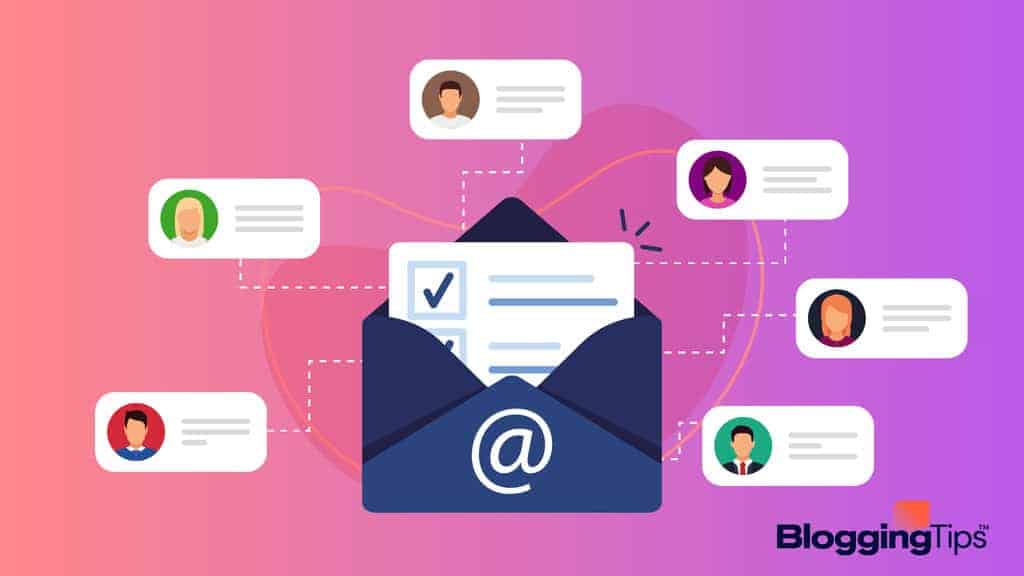
Is Gmail a Secure Email Provider?
This depends on what you want out of a secure email provider.
Gmail is secure in the sense that it uses end-to-end encryption and you can enable two-factor authentication.
However, it’s not a private email service as it collects your data and sells it to third parties for targeted advertising, as do most big tech companies.
How Do Cyber Criminals Reach My Email?
One of the most common exploits cyber criminals use is by using passwords from data breaches or leaks.
For example, if you use the same password across most platforms and one of them experiences a breach, your email address and password could end up in the wild west of the internet.
Alternatively, if someone has access to your email address but not your password, they can target you with phishing links or sketchy attachments that install malicious software (malware) on your system and grant them access.
Final Words
While Gmail is considered the standard email provider for most people, the more privacy-conscious users easily recognize the need for more secure email service providers, which encrypt emails using end-to-end encryption and add extra layers of security through no-logs policies, two-factor authentication, and more.
Our favorite secure email service provider is ProtonMail, which offers all the benefits we expect out of such a service and even has a free plan with 1 GB of storage space.
Plus, its servers are kept in nuclear bunkers in Switzerland, so it doesn’t get more secure than this!
There are some other options to explore if ProtonMail doesn’t tick all your boxes, though.
For example, you have Tutanota (Germany), Mailfence (Belgium), mailbox.org (Germany), and StartMail (the Netherlands).






